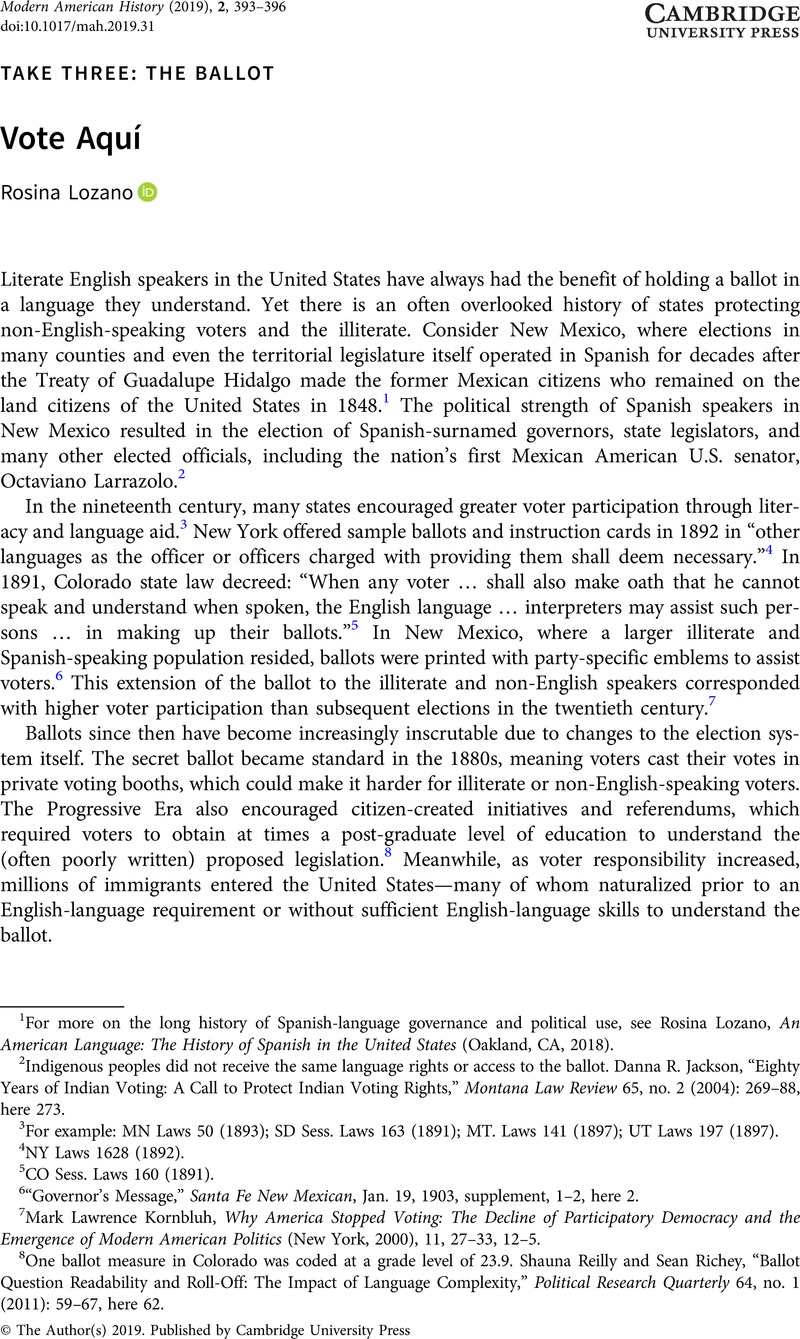Published online by Cambridge University Press: 09 December 2019

1 For more on the long history of Spanish-language governance and political use, see Lozano, Rosina, An American Language: The History of Spanish in the United States (Oakland, CA, 2018)CrossRefGoogle Scholar.
2 Indigenous peoples did not receive the same language rights or access to the ballot. Jackson, Danna R., “Eighty Years of Indian Voting: A Call to Protect Indian Voting Rights,” Montana Law Review 65, no. 2 (2004): 269–88Google Scholar, here 273.
3 For example: MN Laws 50 (1893); SD Sess. Laws 163 (1891); MT. Laws 141 (1897); UT Laws 197 (1897).
4 NY Laws 1628 (1892).
5 CO Sess. Laws 160 (1891).
6 “Governor's Message,” Santa Fe New Mexican, Jan. 19, 1903, supplement, 1–2, here 2.
7 Kornbluh, Mark Lawrence, Why America Stopped Voting: The Decline of Participatory Democracy and the Emergence of Modern American Politics (New York, 2000), 11, 27–33, 12–5Google Scholar.
8 One ballot measure in Colorado was coded at a grade level of 23.9. Reilly, Shauna and Richey, Sean, “Ballot Question Readability and Roll-Off: The Impact of Language Complexity,” Political Research Quarterly 64, no. 1 (2011): 59–67CrossRefGoogle Scholar, here 62.
9 IL Laws 7 (1923).
10 Illinois had a longer history of paying for translations that included paying to have the governor's message printed in German, French, and Scandinavian in 1869. That same year, Illinois gave Peoria and Pekin the right to have permits printed in German. IL Laws 412, 723 (1869); IL Laws, v.II 176 (1869).
11 85 Cal. Rptr. 20, 33-4, quoted in Tom Reston to David S. Tatel, memorandum, Dec. 15, 1974, p. 8, folder 8, box 240, Mexican American Legal Defense and Educational Fund Records, 1967-1983 (M673), Department of Special Collections, Stanford University Libraries, Stanford, CA (hereafter MALDEF).
12 United States District Court Southern District of New York, Opinion and Order 73 Civ. 3921, July 25, 1974, 5–6.
13 Tucker, James Thomas, The Battle over Bilingual Ballots: Language Minorities and Political Access under the Voting Rights Act (Burlington, VT, 2009), 27–52Google Scholar.
14 Extension of the Voting Rights Act: Hearings before the Subcommittee on Civil and Constitutional Rights of the Committee on the Judiciary, 94th Cong. 24–25, Pt. I (1975) (hereafter Extension of the VRA), 78.
15 Extension of the VRA, 360–1.
16 Extension of VRA, “Who Votes,” 783–6; Extension of the VRA, “Estadistica Electoral Sobre Las Elecciones Generales,” 772.
17 PRLDEF, Commencing Another Decade of Challenge, Annual Report, 1982, p. 6, folder 2, box 6 reel 4, The Puerto Rican Legal Defense and Education Fund Papers [microform edition].
18 Honorable J. Stanley Pottinger, memorandum, RE: Applicability of Voting Rights Act of 1965 to Texas and Other Areas of the U.S. Southwest Having Large Concentrations of Spanish-Speaking Voters, Jan. 22, 1975, p. 4–5, folder 2, box 125, MALDEF.
19 MALDEF News Release, “MALDEF's president testifies at Senate Voting Rights Act Hearing,” Jan. 27, 1982, p. 2, folder 3, box 99, MALDEF.
20 University of New Mexico, Department of Linguistics, Voting Rights Project, Bilingual Election Services, v. 1 A Handbook of Ideas for Local Election Officials, (Washington, DC, 1979), 3.
21 U.S. Congress, Senate, Committee on the Judiciary, Extension of the Voting Rights Act: Hearings Before the Subcommittee on Civil and Constitutional Rights of the Committee on the Judiciary, vol. 1, 97th Cong., Session 1, 1982, 307.
22 “MALDEF's President Testifies at Senate Voting Rights Act Hearing,” Jan. 27, 1982, p. 1, folder 3, box 99, MALDEF.
23 Bill Donovan, “‘Special Solution’ Needed for Navajo Voting,” Gallup Independent, Sept. 30, 1975, 1–38, here 1.
24 For more on debates over access to the ballot, see Berman, Ari, Give Us the Ballot: The Modern Struggle for Voting Rights in America (New York, 2015)Google Scholar.
25 Richard Salame, “Vote Aquí? Limited-English-Proficiency Voters Could Help Determine Congress,” The Nation, Nov. 5, 2018, https://www.thenation.com/article/limited-english-voters-investigation-election/ (accessed Sept. 18, 2019).